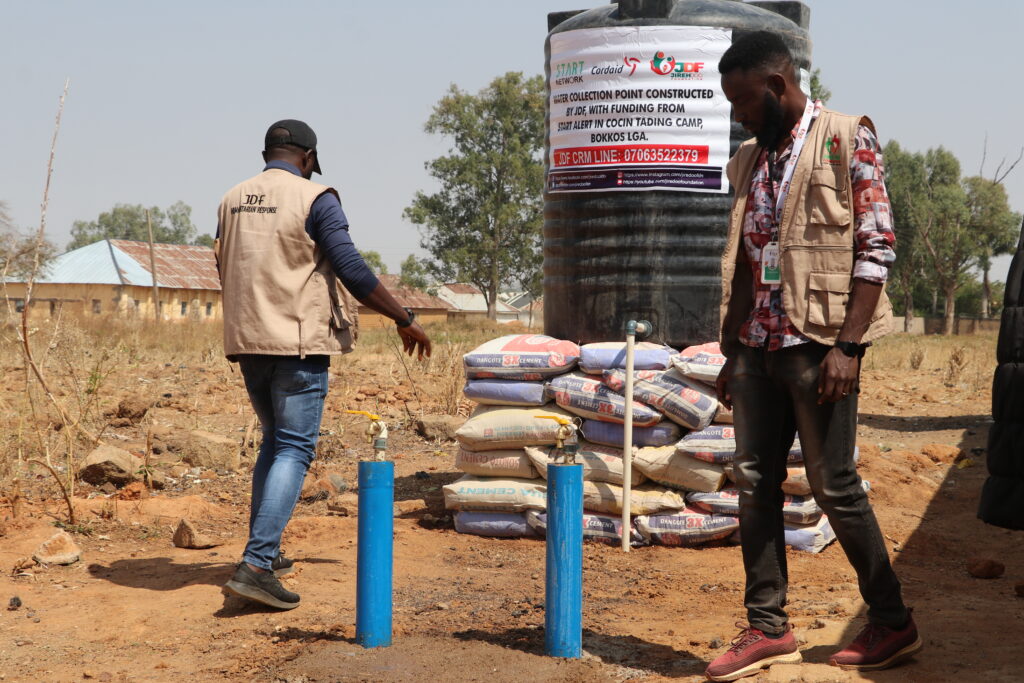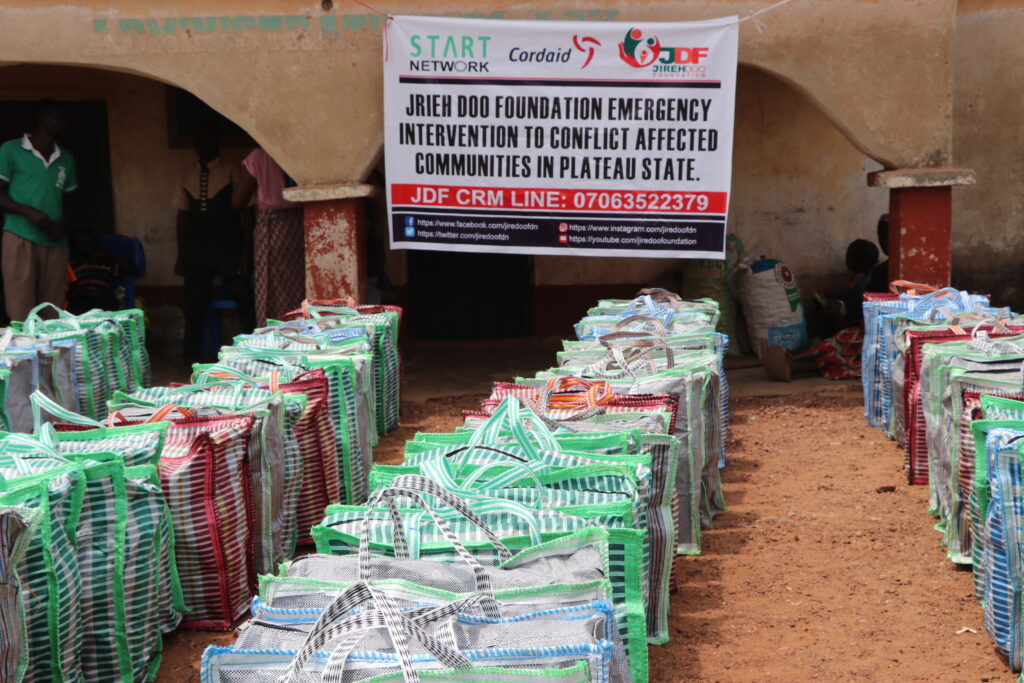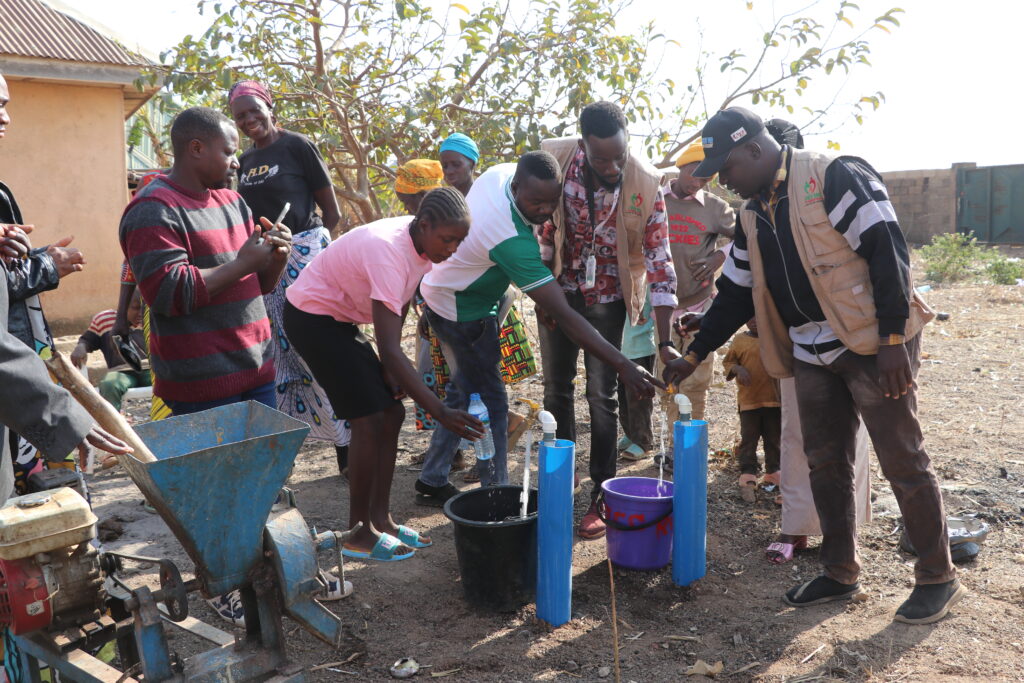In parts of Nigeria, the resurgence of attacks by armed groups like Boko Haram and its offshoot, the Islamic State West Africa Province (ISWAP), continues to devastate communities. With the support of Cordaid and the Start Fund, the Jireh Doo Foundation (JDF) has been able to respond quickly to the needs of the affected population.

Borno State remains the epicentre of the conflict between the government and Islamist extremist group Boko Haram. Over the past year, attacks and kidnappings by ISWAP also increased in the region.
‘The security context here is very fluid. It can change at any time, making it difficult to respond effectively,’ says Kingsley Okpabi, programme manager for JDF. ‘There are frequent attacks, leading to mass displacement. Even the camps for displaced people aren’t safe, with reports of attacks and explosions.’
Good provision
Against this backdrop of conflict and insecurity, humanitarian organisations like JDF are stepping in to provide much-needed relief. Jireh Doo means “good provision”, which describes the organisation’s activities quite accurately. The response occurred in Plateau State in North Central Nigeria, where a large displaced population resides.
Kingsley: ‘We provide various services, including cash distributions, non-food items, psychosocial support, hygiene kits and medical supplies. But our interventions are not just about meeting immediate needs. We also support people so they can start rebuilding their lives.’

Locally-led response
In these complex and volatile environments, it is crucial to empower and capacitate local organisations as much as possible, Kingsley says. ‘Organisations like ours are rooted in the community and understand the local context much better than international organisations. We can relate to the people. Engage with them. We live among them. They trust us. This allows us to respond more effectively and with greater accountability. We also have access to areas that international organisations often can’t reach due to security concerns. Additionally, we operate with fewer overhead costs, meaning more resources go directly to those in need.’
‘This approach is incredibly valuable to us and to the humanitarian sector in general.’
Start Network
In January, Cordaid and JDF could organise a timely humanitarian response in Plateau State by accessing the funds of the Start Network. This is a coalition of more than 90 non-governmental organisations, Cordaid included, across five continents, which focuses on early action, innovation, and locally-led crisis responses. ‘Our mission is to create a new era of humanitarian action that will save even more lives. We aren’t driven by media headlines or political will, we’re here for the communities affected by and at risk of crises,’ the Start Network states on its website.
One of the network’s most effective tools is the Start Fund, which provides rapid contingency funding for under-the-radar, small to medium-scale crises. Unlike traditional funding mechanisms that can be slow and bureaucratic, the Start Fund operates swiftly, disbursing funds for a 45-day response within 72 hours of a crisis alert. This allows for immediate, locally-tailored responses. Kingsley: ‘This approach is incredibly valuable to us and to the humanitarian sector in general.’
Raising alerts, securing funds
The Start Fund operates by allowing organisations to raise alerts during a crisis, such as flooding or conflict. A committee reviews the alerts, and if accepted, organisations can submit proposals.

As a Start member, Cordaid raised an alert for the situation in Nigeria and together with JDF secured funding for the humanitarian response, in which JDF reached over 16,000 people. The collaboration between JDF and Cordaid is an example of how an equitable partnership can effectively provide timely assistance to those in need.
‘If we all work together, we can make more impact and help communities recover more sustainably.’
Wrong coping mechanisms
‘The alert system ensures that resources can be quickly deployed,’ Kingsley explains. ‘It also ensures that the partner with the most suitable skills and presence within the context responds before further funding can be sourced, which may take a longer time. Displaced people have immediate needs and if they are not being addressed, it can lead to the adoption of the wrong coping mechanisms to survive. This may cause further harm.’
Although locally-led humanitarian assistance is the way forward, Kingsley believes there will always be a crucial role to play for both local and international partners in the sector. ‘While local organisations can lead the response on the ground, our international counterparts can focus on system strengthening, visibility, and resource mobilisation. If we all work together, we can make more impact and help communities recover more sustainably.’